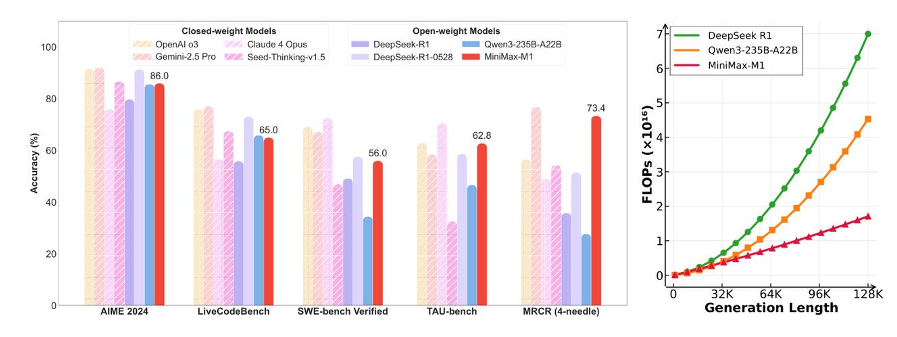On June 17, Shanghai-based AI unicorn company MiniMax released its newly developed MiniMax-M1 series models, claiming to be the world's first open-source large-scale hybrid architecture inference model. This innovative model has achieved significant breakthroughs in context processing capability and cost control.
The highlight of the MiniMax-M1 model lies in its native support for an impressive context window of up to 1 million Tokens, even allowing up to 80 thousand Tokens for inference output. This technological advancement is on par with Google's Gemini2.5Pro, and in tool usage scenarios (TAU-bench), MiniMax-M1-40k outperformed Gemini-2.5Pro, showcasing its powerful capabilities. Additionally, MiniMax stated that the reinforcement training cost of the M1 model was only $535,000, reducing by an order of magnitude compared to previous costs.

In terms of pricing strategy, MiniMax adopted a tiered pricing approach where the cost increases with the length of the input text. Specifically, for inputs between 0-32k Tokens, the cost is $0.8 per million Tokens for input and $8 per million Tokens for output; for 32k-128k Tokens, it is $1.2 and $16 respectively; and for 128k-1M Tokens, the input and output costs are $2.4 and $24 respectively. This pricing setting makes MiniMax-M1 more competitive in the market, especially at the first two tiers, which are lower than similar products like DeepSeek-R1.
Notably, MiniMax also launched the CISPO algorithm this time, which converges twice as fast as ByteDance's recently released DAPO algorithm and requires only 30% of the computational power needed for DeepSeek R1 during the reinforcement learning phase. This makes the training of MiniMax-M1 models more efficient, significantly reduces the use of computational resources, and further lowers operational costs.
In the competition among the "Six Little Tigers" in the AI industry, MiniMax's release signifies its aim to continue advancing in the field of large models. With the imminent launch of DeepSeek R2, the future market situation will become even more complex. MiniMax is also continuously updating its open-source technology, and more technologies and products are expected to be unveiled in the coming days.
